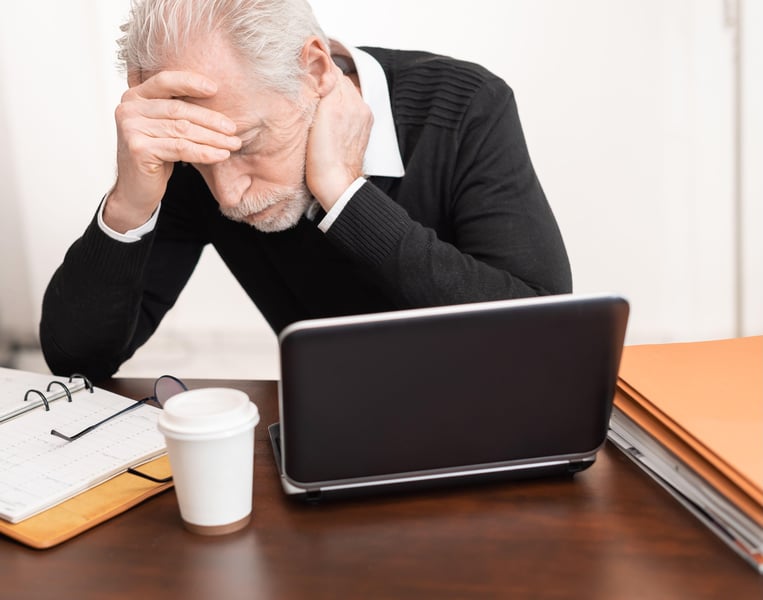Manténgase sano!

- Alan Mozes
- Posted March 24, 2023
Losing a Spouse May Be More Lethal for Men
While losing a spouse can shorten anyone's life, new Danish research suggests widowers may be far more vulnerable than widows.
After six years spent tracking health outcomes among nearly 925,000 Danish seniors, investigators determined that when a man between the ages of 65 and 69 loses his wife he is 70% more likely to die in the year that follows, when compared with his non-widowed peers.
Among surviving wives, however, that rise in risk was just 27%.
Why the difference? Study author Alexandros Katsiferis said he could only offer a few theories.
"We do not have the data to accurately answer that question, so we cannot be very confident on the reasons why this phenomenon tends to happen,"noted Katsiferis, a doctoral fellow with the section for epidemiology in the department of public health at the University of Copenhagen.
But he pointed out that elderly widows may be better than widowers at "absorbing the shock, [including] the hurdles of taking care of a sick husband, along with all the needs and quirks"leading up to the husband's passing.
By contrast, it could be that the "physical and emotional health [of men] relies on the willingness of their spouse to take care of them,"he added. "So, when their wife is out of their life, you get this collapse."
Katsiferis and his colleagues noted that all of the study participants were 65 and older, with an average age of 73 to 75. About 55% were women.
During the study period, more than 8% lost a spouse, though there was a gender gap here as well: While just over 6% of the male enrollees ended up losing a wife, that figure was 10% among women. On average, survivors were between 77 and 79 when their spouse died.
The research team tracked two main indicators of survivors' health post-loss: the amount of money they spent on health care in the three years following their loss and their own post-loss risk of dying during the study.
The health care spending analysis focused on any shifts in money laid out for survival home care, hospitalization, prescription drugs, and/or primary care among roughly half of the pool of widows and widowers. (This was money spent above and beyond the expenses that would be covered by Denmark's national health care system.)
The analysis revealed that while survivor health care expenses rose across the board in the year after spousal loss, it rose significantly more among men, regardless of the age of the man when he lost his wife. Only among survivors who lost their spouse at the age of 85 or older were rising medical expenses roughly equal between men and women.
On the other front, the investigators found that women only experienced an increased risk for dying post-loss if they were relatively young -- meaning between 65 and 69 -- when their husband passed. In that case, risk rose by 27%. But if they had been 70 or older at the time of their loss, their own risk for dying was either no higher than women who had not been widowed or even somewhat lower.
Not so for men. Husbands who had lost their wives when they were between 65 and 84 all saw their own risk of dying rise, though the degree of increased risk was incrementally lower among husbands who were older at the time of loss. Only among men 85 and up was risk seen to decrease slightly.
As to what could be done to improve health and longevity among surviving spouses, Katsiferis cautioned that the issue is "a multifaceted, complex problem with no straight answer."
Still, he pointed to the need for bereavement services, home care assistance, social interaction and efforts to ensure that survivors are not isolated following their loss.
The findings were published online March 22 in the journal PLOS ONE.
"Mental health support is also another obvious crucial process that should be part of the solution,"Katsiferis added, noting that such support may be less sought out among surviving husbands, out of "the fear of showing vulnerability."
That thought was seconded by Dr. Mohana Karlekar, section chief of palliative care medicine at Vanderbilt University Medical Center in Nashville, Tenn.
"Grief is real. For men and women,"she said. "It can manifest as anxiety or depression. And it can manifest physically in so many ways -- as headaches, as weight loss, insomnia, joint pain, aches."
But, Karlekar added, "Historically, women tend to be more social and more willing to talk about these things. In addition, if you've been the main caregiver leading up to your loss, you've probably already been more secluded than usual, even before. So you may not know how to ask, or who to ask, for help. And typically that's even more of an issue for men."
For those who are concerned about the health and welfare of survivors, it can be helpful to embrace "the guiding principle that palliative care is based upon, which is valuing the person,"she advised.
"Siblings, friends, people from your church community: we all have to pay attention to those who are grieving. I have a patient who died, suddenly, at the age of 78, after falling down the stairs. The family wasn't expecting it," Karlekar said. "But I was able to meet with the family, have conversations. And the widow is doing really well now, because she has a family, a community of people who are there and who are able to check in on her. It's so important. Community matters."
More information
There's more on coping with grief at Harvard Medical School.
SOURCES: Alexandros Katsiferis, PhD fellow, section for epidemiology, department of public health, University of Copenhagen, Denmark; Mohana Karlekar, MD, section chief, section of palliative care medicine, Vanderbilt University Medical Center, Nashville; PLOS ONE, March 22, 2023, online
